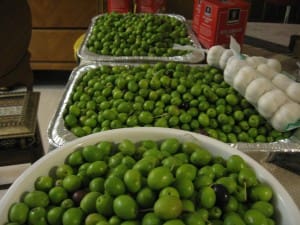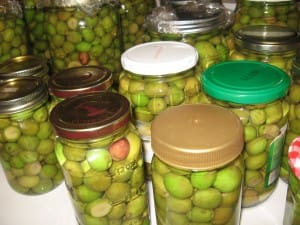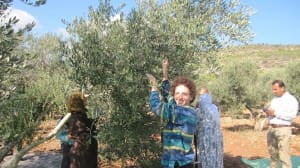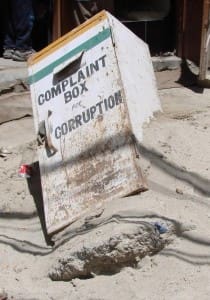One of my close friends called today to say, “I know this is pretty bold of me, but I was wondering if you’re going to cure olives again this year. I’ve been craving them so. Could you give me two jars this time?”

My dear friend isn’t Arab–she’s just got a taste for olives. She has no idea what goes through my mind while I’m picking and sorting through the bins of fresh olives at the Arabic market in my southern California neighborhood. She couldn’t imagine what I think about while I’m hauling home 39 pounds of them, washing and cracking them on my kitchen counter, tossing away most of the leaves and twigs but keeping a few “because it’s good for them to stay together” as my grandmother used to say.
It’s olive harvest season in Palestine, but so many of the laden branches will go unpicked or be crushed under an Israeli bulldozer while farmers weep in the distance. These trees, many of them quite ancient, stand in stately rows while their fruit develops over the course of months. And when the moment is just right and the olives are still “hard, but not too hard, habibti,” it’s important to pick them to arrest the ripening process so that they will cure to a consistent flavor throughout the batch.
The practice of bulldozing olive groves or setting them on fire began some years ago as one of the many measures of collective punishment imposed by the Israeli Defense Forces (IDF). The first time I saw pictures of trees being crushed under military bulldozers, I wept out loud. Knowing the decades of devoted attention given to those gnarled branches, it looked to me like a picture of babies being smashed to death. I still feel sick whenever I hear that a grove was destroyed by soldiers on the night before harvest. It’s so different than hearing that the trees were uprooted by a flood or succumbed to some soil-borne virus. This is murder.
Olive trees are among a handful of sources from which Palestinians can earn a livelihood even under occupation. If a family is lucky enough to still maintain control of their land (as opposed to simply holding title through a virtually worthless deed), they can raise crops or animals, but both require regular access to water which of course has been redirected away from Palestinian villages in many cases. Olives, however, will grow robustly with only sun and the rain gifted by God. Olive trees give rise not only to the olive industry but oil, soap, and, now, wood carvings lovingly fashioned from the wood of trees murdered in the night. Praying hands, figurines of the magi, latticed stands for the Holy Qur’an reveal the knot holes from the fruit-bearing branches from which they were wrested.
These days, it’s fairly easy to find groups of Americans or Europeans traveling to Palestine to assist with the olive harvest. Rather than exploring traditional tourist sites, these folks come prepared to work hard, sometimes even sleeping among the trees along with the farmers in order to guard the grove.
Not that they could fend off the soldiers. Not that anyone could.
As has been proven year after agonizing year, nothing can fend off the soldiers. Or the settlers.

So yes, I tell my dear friend: I can certainly promise you two jars of olives this year. Maybe three. It’s a painstaking, labor-intensive process that I happily undertake each autumn, distributing dozens of jars among my family and friends at Christmastime. I do it because I can. And I do it for the women who can’t; the women who, along with their families, watched their trees carefully to determine just to right time for harvest, but who woke in the night to the sound of thunder. Or so they thought.
And here’s a bonus picture of me (Nora) picking olives in Palestine:

